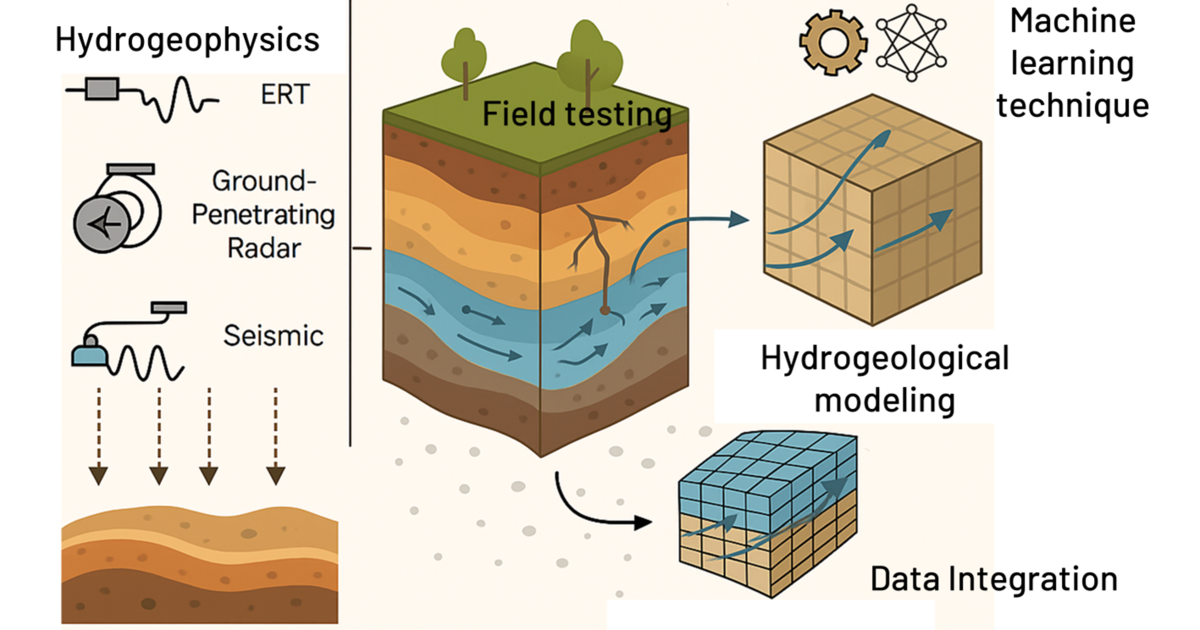Hydrogeophysical Methods and Hydrogeological Models
A special issue of Water (ISSN 2073-4441). This special issue belongs to the section "Hydrogeology".
Deadline for manuscript submissions: 30 January 2026 | Viewed by 1411

Special Issue Editors
Interests: hydrogeophysical modeling and inversion; machine learning and data assimilation techniques for reservoir characterization; field hydraulic and tracer tests; multiscale hydrogeological modeling; geothermal energy utilization and optimization
Special Issues, Collections and Topics in MDPI journals
Interests: aquifer characterization; hydraulic and heat tomography; numerical modelling; hydrogeological field investigation
Special Issues, Collections and Topics in MDPI journals
Special Issue Information
Dear Colleagues,
We are pleased to invite you to contribute to a forthcoming Special Issue titled “Hydrogeophysical Methods and Hydrogeological Models”, to be published in Water. This Special Issue aims to highlight innovative research that bridges the gap between hydrogeophysical data acquisition and hydrogeological modeling. Despite substantial progress in geophysical techniques for subsurface characterization, their integration into predictive, quantitative models of groundwater systems remains a key challenge. This Special Issue seeks to foster interdisciplinary approaches that combine field measurements, computational techniques, and conceptual advancements to enhance the reliability and utility of hydrogeological models.
We welcome original research articles, methodological papers, and field-based case studies. Topics of interest include, but are not limited to, the following:
- Development and application of hydrogeophysical methods;
- Integration of geophysical data into groundwater models;
- Coupling of geophysical data with groundwater flow and transport models;
- Inversion techniques and uncertainty quantification;
- Time-lapse monitoring and data assimilation;
- Case studies in groundwater management and environmental remediation.
This Special Issue seeks to foster interdisciplinary dialog and showcase cutting-edge research that pushes the boundaries of how hydrogeophysical tools can inform and transform hydrogeological understanding. We look forward to receiving your contributions and to showcasing impactful work at the forefront of hydrogeophysics and hydrogeology.
Dr. Quan Liu
Prof. Dr. Rui Hu
Guest Editors
Manuscript Submission Information
Manuscripts should be submitted online at www.mdpi.com by registering and logging in to this website. Once you are registered, click here to go to the submission form. Manuscripts can be submitted until the deadline. All submissions that pass pre-check are peer-reviewed. Accepted papers will be published continuously in the journal (as soon as accepted) and will be listed together on the special issue website. Research articles, review articles as well as short communications are invited. For planned papers, a title and short abstract (about 250 words) can be sent to the Editorial Office for assessment.
Submitted manuscripts should not have been published previously, nor be under consideration for publication elsewhere (except conference proceedings papers). All manuscripts are thoroughly refereed through a single-blind peer-review process. A guide for authors and other relevant information for submission of manuscripts is available on the Instructions for Authors page. Water is an international peer-reviewed open access semimonthly journal published by MDPI.
Please visit the Instructions for Authors page before submitting a manuscript. The Article Processing Charge (APC) for publication in this open access journal is 2600 CHF (Swiss Francs). Submitted papers should be well formatted and use good English. Authors may use MDPI's English editing service prior to publication or during author revisions.
Keywords
- hydrogeophysics
- groundwater modeling
- aquifer characterization
- uncertainty analysis
- machine learning methods
Benefits of Publishing in a Special Issue
- Ease of navigation: Grouping papers by topic helps scholars navigate broad scope journals more efficiently.
- Greater discoverability: Special Issues support the reach and impact of scientific research. Articles in Special Issues are more discoverable and cited more frequently.
- Expansion of research network: Special Issues facilitate connections among authors, fostering scientific collaborations.
- External promotion: Articles in Special Issues are often promoted through the journal's social media, increasing their visibility.
- Reprint: MDPI Books provides the opportunity to republish successful Special Issues in book format, both online and in print.
Further information on MDPI's Special Issue policies can be found here.






